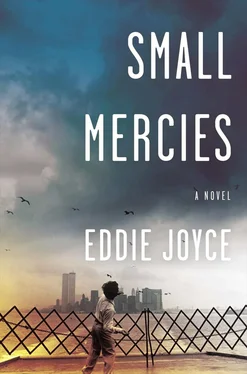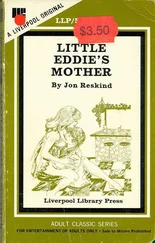Tina looks through the pictures and each one summons the same question: How could the same man love this woman and love me?
One particular photo draws Tina in. Morgan is alone in this one, wearing hiking gear: thick socks and clunky boots, an oppressive backpack, a sweat-stained tank top. Her hair is pulled back in a ponytail and her lips are pursed in a tight smile under sunglasses. She’s sitting on a large stone and behind her, Tina can see the white trunks of trees.
The Morgans in the other pictures are unaware, anchored to the moment of the photo, but this one knows somehow. Knows that another woman will be looking at this very picture one day. The look on this Morgan’s face is one of reluctant acceptance. It unsettles Tina, but after she stares at it for a minute, it’s oddly comforting.
Some part of Wade will always belong to Morgan in the way that some part of her will always belong to Bobby. That’s the way it has to be. It’s not even a sadness. It couldn’t be any other way; their losses bind them to each other. Sure, it’s other things as well, but without their losses, there’s little chance they would have found each other in a thousand years. It’s okay to admit that. Their losses were the most important events in their lives. There’s no shame in loving each other for the way they carried them.
Tina thinks back to earlier in the night on the BQE. She was so consumed by her own emotions, it didn’t sink in that they were almost in a car accident. He reached his hand across like he could actually prevent her from going through the windshield. Morgan died in a car accident on the Cross Bronx Expressway, driving up to look at a house for sale in Rye. They wanted a yard and a family to fill it. She was thirty-four, having trouble getting pregnant. The coroner said death was instantaneous, she didn’t suffer.
Small mercies.
She lifts the photo to her mouth, kisses the sunglass-ed image of Morgan.
“I’m sorry,” she says. She puts the photo back in the box and sets the box on the bed.
She wants to punctuate this moment, singe the night into her memory. She remembers the pack of cigarettes that Stephanie left in her purse. She goes back to the kitchen, finds her purse, and fishes a cigarette from the pack. She lights it on the stove top and then goes back to the office. She opens the sliding door and steps onto the terrace.
It’s cold outside. The rain has stopped, but the cement on the terrace is still wet beneath her bare feet. The terrace extends around the corner, back around to where Wade is still sleeping in the master bedroom. A covered gas grill and a few throaty pigeons are her only companions.
Tina can hear the city below. She walks to the corner of the terrace. Even at this hour, thousands of tiny lights illuminate the city. She can see the harbor through other buildings. She can see Brooklyn, the Verrazano, the ferry terminal, the hilly North Shore of Staten Island, the last-century industries of the Jersey waterfront. She feels the flesh on her legs ripple with goose pimples. She takes a drag of the cigarette.
She’s never felt smaller than she does at this moment. The enormity of the city, the space and significance of it, overwhelm her. She sees herself from a mile away, a fleck of nothing on one terrace on one floor in one tall building of thousands.
She lowers the lit end of her cigarette into a puddle on the railing. She flicks the stub out into the cold air and watches it plummet into the cradled space between buildings.
The color of the night is shifting from black to deepest blue. Dawn is coming. The daylight will break over Long Island first, make its way over the boroughs, illuminate Staten Island last. Her gaze fixes on Staten Island and its low, whispering darkness. The only place she’s ever called home. She wishes she could hold back the dawn, prevent the light from crossing the Verrazano, hold back the day and its inevitable sadnesses for all those she loves.
But her wishes are useless. The dawn’s march is steady, executed without mercy or cruelty, and even this colossus of a city is powerless against it. In mere minutes, the dawn has passed and left the pristine blueness of a perfect day in its wake.
Chapter 3 A QUARTER COME TO REST IN A QUIET PLACE
Gail is already awake when first light reaches the house. She skimmed through sleep, like a stone skipping over water. Strange dreams skittered away when she woke, the retreat of their dark tendrils leaving her anxious. She shifts to a sitting position, massages her closed eyes with the palms of her hands.
She puts on an oversized FDNY sweater and a pair of gray sweatpants, walks across the hall to Bobby’s room. She lies on his bed, hoping to cajole her body into another half hour of shut-eye, but it’s useless: she’s up. Nothing short of a case of Chianti will remedy that.
She goes downstairs to the kitchen, takes a Tupperware container out of the fridge, grabs a fork, and sits at the table. She uses the side of the fork like a knife, carves off a sliver of meatball. She goes back to the fridge, finds a container of sauce, and pours some in with the meatballs. She stares, bleary-eyed, out at the street. It rained in the night; she could hear it from bed. The street is still slick with it and the air smells thick and lush.
They didn’t go into the city last night. She told Michael she was too tired. She didn’t tell him about Tina’s new fella. Soon enough.
A pocket of drizzle descends on Wirra Lane. Across the street, one of their new neighbors, Dmitri, runs out from the old Grasso house to his car. He is thin, tall, Russian. The wife, Ava, seems nice; her face always carries a smile, but she speaks very little English. They have two young kids, a boy and a girl, with dirty-blond hair and the pinched faces of the frequently disciplined. The family moved in two years ago, after the Grassos moved to a retirement home in New Jersey.
“The last stop,” Sal Grasso told them on the day they moved out. Michael laughed. Gail bit her lip so she wouldn’t. Sal’s wife, Carla, punched Sal’s shoulder.
“Stop saying that.”
“What?” he said, as one beefy hand rubbed his enormous gut and the other brought a cigarette to his mouth. “How long you think I got anyway, babe?”
It was hard to argue with Sal. He was an obese, two-pack-a-day smoker charging hard on seventy, with two heart attacks in his rearview, possessed of a complete unwillingness to make any lifestyle changes at “this stage of the game,” as he put it.
But the joke was on him after all. Three months after they moved, Carla was dead. A massive stroke. The one thing Sal had never counted on was outliving his wife, who was a decade younger and infinitely healthier. The last Gail had heard was that he’d moved out to Vegas to work as a blackjack dealer, something he always wanted to do. Go figure.
The Grassos had been good neighbors: friendly, not too nosy, helped you in a pinch. Invited Gail and Michael over for drinks every year sometime around the holidays. They reciprocated with a barbecue once a summer. Close, but not too close.
The Russians aren’t as friendly. Michael gave up after inviting Dmitri to the Leaf one night. Dmitri said he didn’t drink, didn’t even thank Michael for the offer. A little brusque in his decline. That was enough for Michael.
“Even the fucking kids are unfriendly.”
Gail feels differently. These things take time. She was a stranger here once. A newcomer in a place with a distaste for newcomers. That newcomer sat at this same table, waiting for Maria.
She runs her free hand over the surface of the table. They’ve had the table since they moved in: a gift from Maria and Enzo. The oak bears the nicks, bruises, and stains of forty years. So many words — angry, joyous, sad, hopeful — have passed over it. This table has heard more secrets than a confessional box. So much news. Even Tina’s nugget from yesterday.
Читать дальше












